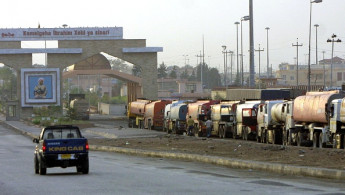Iraq finalises deal to resume Kurdish crude exports to Turkey
Iraq's federal and Kurdish governments have finalised a deal to resume crude oil exports through Turkey pending a response from Ankara, a statement from the autonomous Kurdistan region said Thursday.
Nearly a decade after launching an international arbitration, the Iraqi federal government in March won the right to control the autonomous Kurdistan region's oil exports through Turkey, which had previously been exported without Baghdad's approval.
The international ruling in March led to the suspension of exports, forcing the Kurdish government in Erbil to negotiate before reaching in early April a "temporary" deal with Baghdad to resume exports.
But grey areas had remained in the deal over technical and financial issues and exports have yet to resume after over a month of interruption.
"The Kurdistan regional government and the federal authorities have reached a deal on the resumption of oil exports" from the autonomous region, Erbil said in a statement Thursday.
Baghdad's State Oil Marketing Organization (SOMO) "has officially requested from Turkey the resumption of oil exports from the Kurdistan region through the Kirkuk-Ceyhan pipeline", the statement said.
Analysis: Iraq's prime minister says the country has ambitions to become a gas exporter.
— The New Arab (@The_NewArab) February 23, 2023
However, US-Iran political fighting in Iraq and internal political alignments might hinder achieving that goal
✍️ @danataibmenmy https://t.co/Bts9hZGGtp
Baghdad and Erbil "await Turkey's response to resume exports," it added.
Oil has long been a lifeblood for the Kurdish region, with 475,000 barrels exported daily via the Turkish port of Ceyhan.
Under the agreement, sales of Kurdistan's crude will be managed by SOMO, with revenues paid into an account jointly owned by Baghdad and Erbil.
In early May, Iraq's Oil Minister Hayan Abdel Ghani said Kurdish fields would resume operating in "a week or two maximum".
He added that tests were being "carried out on oil pipelines" in Turkey following February's devastating earthquake, causing delays in the resumption of exports.
But other details of the deal remained unclear, including "the management of the bank account, the money earned in return for exports... who has the right to administer this money," Abdel Ghani said at the time.




 Follow the Middle East's top stories in English at The New Arab on Google News
Follow the Middle East's top stories in English at The New Arab on Google News

![A group of Palestinians, foreign and Israeli activists gather to participated in an olive picking event on the land in the town of Battir, which is under threat of confiscation by Israel in Bethlehem, occupied West Bank on 8 November 2024. [Getty]](/sites/default/files/styles/image_330x185/public/2182930803.jpeg?h=199d8c1f&itok=__0LgGsa)
